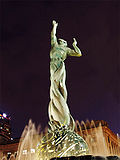Plotinus (/plɒˈtaɪnəs/; Greek: Πλωτῖνος, Plōtînos; c. 204/5 – 270 CE) was a Greek Platonist philosopher, born and raised in Roman Egypt. Plotinus is regarded...
68 KB (8,778 words) - 19:55, 25 September 2024
Neoplatonism (section Plotinus)
with Ammonius Saccas and his student Plotinus (c. 204/5–271 AD) and stretched to the sixth century. After Plotinus there were three distinct periods in...
53 KB (6,684 words) - 22:47, 13 September 2024
transmitted to the lower, which remained unchanged by the lower emanations. For Plotinus and Porphyry the emanations are as follows: To Hen (τό ἕν), The One: Deity...
11 KB (1,358 words) - 21:02, 25 August 2024
students of Plotinus. The philosopher Plotinus was the founder of a tradition later known as Neoplatonism. Porphyry, the most important of Plotinus's pupils...
6 KB (838 words) - 20:27, 19 January 2023
The logos was a key element in the meditations of Plotinus regarded as the first neoplatonist. Plotinus referred back to Heraclitus and as far back as Thales...
38 KB (4,399 words) - 17:18, 22 September 2024
as Plotinus and Porphyry, though perhaps not to later neoplatonists such as Iamblichus. Gnostics were in conflict with the idea expressed by Plotinus that...
16 KB (2,143 words) - 16:42, 27 August 2024
known as the teacher of Plotinus, whom he taught from 232 to 243. He was undoubtedly the most significant influence on Plotinus in his development of Neoplatonism...
18 KB (2,146 words) - 09:16, 4 October 2024
Enneads (category Plotinus)
collection of writings of the philosopher Plotinus, edited and compiled by his student Porphyry (c. AD 270). Plotinus was a student of Ammonius Saccas, and...
14 KB (1,829 words) - 20:02, 21 January 2024
Theology of Aristotle (redirect from Arabic Plotinus)
by Plotinus' works as mediated through the Theology and similar works. The translator attempted to integrate Aristotle's ideas with those of Plotinus —...
6 KB (798 words) - 05:14, 17 November 2023
and began a period known as Middle Platonism. In the 3rd century AD, Plotinus added additional mystical elements, establishing Neoplatonism, in which...
33 KB (3,973 words) - 03:01, 4 September 2024
clear that Origen's fellow students Plotinus and Longinus treated him with respect. According to Porphyry, Plotinus estimated him so far as to say that...
3 KB (354 words) - 05:14, 26 April 2024
History of the location of the soul (section Plotinus)
death. Plotinus believed in two parts of the soul, a higher level rational part and the lower level portion located in the entire body. Plotinus saw the...
26 KB (3,873 words) - 10:52, 3 July 2024
or discourse on the One that appears most notably in the philosophy of Plotinus. Henology stands in contradistinction to several other philosophical disciplines...
2 KB (188 words) - 00:00, 5 October 2024
ISBN 978-2-85653-867-8, retrieved 2024-07-10 "The Enneads of Plotinus: Porphyry: On the Life of Plotinus and the Arrangement of his Work". www.sacred-texts.com...
38 KB (3,915 words) - 06:33, 4 September 2024
universe. Plotinus compared his principle of 'the One' to an illuminating light, as Plato did with the Form of the Good. As a result of Plotinus' school...
11 KB (1,505 words) - 03:00, 2 July 2024
Apophatic theology (section Plotinus)
and Christian mysticism. Plotinus (204/5–270 AD) was the founder of Neo-Platonism. In the Neo-Platonic philosophy of Plotinus and Proclus, the first principle...
94 KB (9,967 words) - 15:23, 15 September 2024
hypostasis of the soul, the intellect (nous) and "the one" was addressed by Plotinus. In Christian theology, the Holy Trinity consists of three hypostases:...
34 KB (4,483 words) - 16:36, 26 August 2024
may be due in part to Plotinus' attempt to refute certain interpretations of Platonic philosophy, through his Enneads. Plotinus believed the followers...
13 KB (1,558 words) - 04:16, 27 August 2024
Theory of categories (section Plotinus)
necessary or contingent. An alternative line of development was taken by Plotinus in the second century who by a process of abstraction reduced Aristotle's...
34 KB (4,737 words) - 12:26, 19 September 2024
diction. In opposition to Plotinus, Longinus upheld the doctrine that the Platonic ideas existed outside the divine Nous. Plotinus, after reading his treatise...
10 KB (1,363 words) - 07:08, 15 January 2024
Infinity (philosophy) (section Plotinus)
the reasoning of which was later studied and commented on by Simplicius. Plotinus considered infinity, while he was alive, during the 3rd century A.D. Simplicius...
21 KB (2,620 words) - 11:39, 18 August 2024
Halfwassen states in Der Aufstieg zum Einen' (2006) that "Plotinus' ontology – which should be called Plotinus' henology – is a rather accurate philosophical renewal...
94 KB (9,650 words) - 09:33, 9 October 2024
Christian mysticism (section Plotinus)
Companion to Plotinus, p. 32). "Everything comes from contemplation" (Cambridge Companion to Plotinus, p. 32). "According to his (Plotinus) metaphysical...
153 KB (18,514 words) - 20:50, 8 October 2024
Valentinius, a lesser deity known as the Demiurge (see also Neoplatonism, Plotinus) had a role in the creation of the material world separate from the Monad...
5 KB (654 words) - 17:08, 4 September 2024
Intelligible form (section Plotinus)
intellect then turns possible knowledge into knowledge in act. According to Plotinus, the power of the Demiurge (the 'craftsman' of the cosmos) is derived from...
4 KB (501 words) - 13:22, 29 July 2024
Iamblichus and instead embraced the original Neoplatonism formulated by Plotinus. The Alexandrian school was renowned at the time for its philosophy, and...
93 KB (10,386 words) - 23:55, 26 September 2024
Immortality (section Plotinus)
soul can never die. Plotinus offers a version of the argument that Kant calls "The Achilles of Rationalist Psychology". Plotinus first argues that the...
90 KB (10,721 words) - 09:40, 3 October 2024
Philosophy of suicide (section Plotinus)
committed against the interests of the state.' The neoplatonist philosopher Plotinus (205-270) devoted a short treatise (Ennead I, 9 = treatise 16) to the question...
26 KB (3,548 words) - 16:36, 17 September 2024










